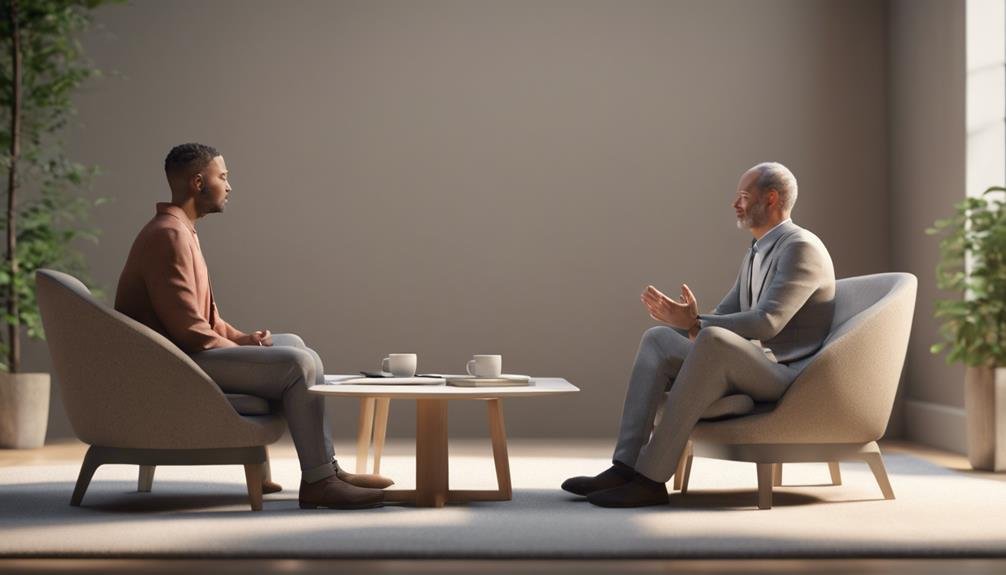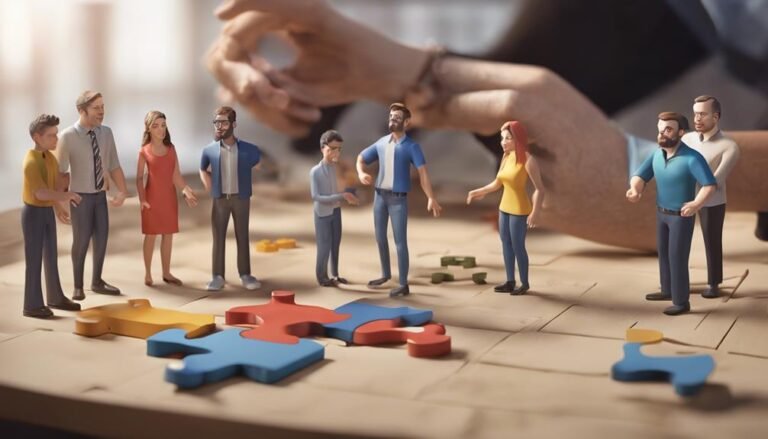Mediation as a Soft Skill
In today's diverse work landscape, mastering mediation as a soft skill is essential. It helps resolve conflicts and build harmonious relationships. By understanding different perspectives and using active listening techniques, you enhance communication and empathy. Establishing common ground and cultivating a positive environment are key. In professional settings, mediation fosters collaboration among team members and boosts productivity. Consider mediation training and resources to hone your skills further. Embrace the power of mediation to thrive in your professional interactions and beyond. Mastering this skill opens doors to more effective communication and conflict resolution strategies.
Key Takeaways
- Enhances communication and conflict resolution abilities
- Fosters empathy and understanding in interactions
- Promotes active listening and respectful dialogue
- Cultivates a positive environment for collaboration
- Essential for professional growth and effective team dynamics
Benefits of Mediation
When considering the benefits of mediation, it becomes evident that the process offers a crucial and efficient way to resolve conflicts. Conflict resolution is at the core of mediation, providing a structured environment where individuals can openly address their issues with the help of a neutral third party. Through this process, participants can work together to find mutually agreeable solutions, fostering a sense of understanding and cooperation.
Moreover, mediation plays an essential role in communication improvement. By encouraging active listening and promoting respectful dialogue, mediation allows individuals to express their thoughts and feelings in a safe space. This leads to enhanced communication skills, helping parties involved in the conflict to articulate their needs effectively and comprehend the perspectives of others.
In essence, mediation not only facilitates conflict resolution but also cultivates a culture of improved communication. By emphasizing collaboration and empathy, mediation serves as a valuable tool in addressing disputes and strengthening relationships.
Understanding Different Perspectives
To gain a deeper understanding of conflicts and foster effective resolutions, it is important to acknowledge and appreciate the diverse perspectives involved. Different perspectives are often the root cause of conflicts, as individuals see situations through their own unique lens shaped by experiences, beliefs, and values. Engaging in critical thinking allows you to analyze these varying viewpoints impartially, helping you grasp the underlying reasons behind conflicting opinions. By recognizing and respecting different perspectives, you can navigate through disagreements with empathy and openness, paving the way for constructive dialogue and mutually beneficial solutions.
| Benefits of Understanding Different Perspectives |
|---|
| 1. Enhances empathy and communication skills |
| 2. Facilitates creative problem-solving approaches |
| 3. Fosters a culture of respect and inclusivity |
Taking time to understand different perspectives cultivates a more inclusive environment where individuals feel heard and valued. Through critical thinking, you can break down barriers, bridge gaps, and work towards harmonious resolutions that consider the diverse needs and viewpoints of all parties involved.
Active Listening Techniques
When engaging in mediation, remember to reflect the speaker's words, clarify any uncertainties, and summarize key points to make sure effective communication. These active listening techniques can help foster understanding and create a conducive environment for resolving conflicts.
Reflecting Speakers Words
Indulge in the art of reflecting the speaker's words as an important aspect of mastering active listening techniques. Reflective listening is foundational in developing strong communication skills. By mirroring the speaker's words, you show empathy and understanding, essential for building trust and resolving conflicts effectively. Empathy building is at the core of reflective listening, allowing individuals to connect on a deeper level and fostering positive relationships. This technique not only aids in conflict resolution but also enhances overall communication proficiency.
| Active Listening Techniques |
|---|
| 1. Reflective Listening |
| 2. Empathy Building |
| 3. Communication Skills |
Clarifying and Summarizing Points
Active listening techniques involve summarizing and clarifying key points to capture the speaker's message effectively. Paraphrasing what the speaker said in your own words shows engagement and understanding. Summarizing complex ideas into manageable chunks aids communication clarity. Restating main ideas concisely demonstrates active listening and comprehension. Addressing misunderstandings promptly fosters effective communication and rapport. Clarity in communication is essential, and summarizing points is a valuable tool for achieving this during mediation.
This structure breaks down the speaker's message into key points and highlights the importance of active listening techniques in communication. It emphasizes the role of summarizing in understanding complex ideas and fostering effective communication during mediation.
Building Empathy Skills
Developing empathy skills is vital for effective mediation and fostering positive relationships. Empathy development plays a significant role in enhancing emotional intelligence, allowing you to understand and resonate with the feelings and perspectives of others involved in the mediation process. By honing your ability to empathize, you can create a supportive and understanding environment where parties feel heard and valued.
To build empathy skills, start by actively listening to the concerns and emotions expressed by each party. Pay attention not only to the words spoken but also to the underlying emotions and non-verbal cues. Reflecting back on what you have heard and acknowledging those emotions demonstrates your empathy and helps establish trust.
Additionally, practicing perspective-taking can broaden your understanding of different viewpoints, enabling you to navigate conflicts with sensitivity and compassion. By cultivating empathy skills through emotional intelligence, you can facilitate more meaningful and productive mediations, ultimately paving the way for mutually beneficial resolutions.
Establishing Common Ground
When mediating, you must focus on finding mutual understanding to establish common ground.
By building rapport effectively, you can create a foundation for successful communication between parties.
Encouraging open communication is key to fostering a collaborative environment during mediation sessions.
Finding Mutual Understanding
Establishing common ground is essential in mediation to foster effective communication and build trust between parties. Exploring commonalities can help both sides see that they share some interests, values, or goals, making it easier to find areas of agreement.
By fostering compromise, you can guide the conflicting parties towards mutually beneficial solutions. Encourage each party to express their perspectives openly while actively listening to the other side's viewpoint. Acknowledging and validating each other's feelings can create a sense of understanding and empathy.
Through this process, you can help parties move from positions to interests, focusing on their underlying needs rather than rigid demands. Building on these shared interests can pave the way for more productive negotiations.
Building Rapport Effectively
Building rapport effectively in mediation starts with identifying common ground to establish a foundation of mutual understanding and trust between the conflicting parties. Trust building is vital in mediation, as it forms the basis for open communication and productive conflict resolution.
Utilizing effective communication techniques is key to fostering this trust. Active listening, paraphrasing, and asking clarifying questions can help parties feel heard and valued, facilitating a sense of connection. Non-verbal cues, such as maintaining eye contact and open body language, also play a significant role in building rapport.
Encouraging Open Communication
To foster effective mediation outcomes, it's essential to cultivate an environment that encourages open communication by identifying common ground among conflicting parties. Trust building forms the cornerstone of successful mediation, paving the way for honest dialogue and mutual understanding.
By establishing a foundation of trust, you create a safe space where parties feel comfortable expressing their thoughts and concerns. Encouraging open communication involves active listening, acknowledging emotions, and validating perspectives without judgment. This process fosters a sense of collaboration and cooperation, leading to more effective resolutions.
Conflict Resolution Strategies
When faced with conflicts, it's important to explore various resolution strategies that can help all parties involved reach a mutually agreeable solution. Conflict resolution techniques and negotiation strategies play a significant role in addressing and resolving disputes effectively. By understanding different approaches such as compromising, collaborating, or accommodating, you can navigate conflicts with confidence.
Building trust is another key aspect of conflict resolution. Trust forms the foundation for productive interactions and paves the way for open communication. When individuals trust each other, they're more willing to engage in constructive dialogue and work towards common goals. Fostering cooperation is equally important, as it encourages collaboration and collective problem-solving.
Enhancing Communication Skills
Effective communication is key in fostering understanding and resolving conflicts. To enhance your communication skills for mediation, focus on empathy building and trust building. Empathy is vital in mediation as it allows you to understand the emotions and perspectives of all parties involved. Practice active listening to show that you genuinely care about what others have to say. By acknowledging their feelings and concerns, you create a supportive environment for open dialogue.
Building trust is another essential aspect of effective communication. Be transparent and honest in your interactions to establish credibility and reliability. Trust is the foundation upon which successful conflict resolution and relationship building are built. When all parties trust the mediator, they're more likely to engage in constructive conversations and work towards mutually beneficial solutions.
Cultivating a Positive Environment
Cultivate a harmonious atmosphere by promoting positivity and encouragement amongst all participants. Creating a positive environment is crucial for effective conflict resolution during mediation sessions. By incorporating positive reinforcement strategies, you can encourage constructive dialogue and promote a sense of collaboration among the parties involved.
Here are some key ways to cultivate a positive environment:
- Active Listening: Demonstrate genuine interest in understanding each participant's perspective.
- Empathy: Show empathy towards the emotions and experiences shared by all parties.
- Maintaining Neutrality: Guarantee that you remain impartial and unbiased throughout the mediation process.
- Celebrating Small Wins: Acknowledge and celebrate any progress made towards resolving conflicts.
- Encouraging Open Communication: Foster an environment where all participants feel comfortable expressing their thoughts and feelings.
Mediation in Professional Settings
In professional settings, mediation serves as a valuable tool for resolving conflicts and fostering collaboration among team members. Conflict resolution is a key aspect of mediation in professional environments, where disagreements and disputes can hinder productivity and teamwork. By utilizing negotiation skills during mediation sessions, individuals can work together to find mutually beneficial solutions that address underlying issues and improve working relationships.
Mediation in professional settings helps create a safe space for team members to express their concerns and perspectives openly. This fosters understanding and empathy, leading to more effective communication and conflict resolution. Through mediation, individuals learn to listen actively, communicate clearly, and collaborate towards common goals, enhancing overall team dynamics and productivity.
Mediation Training and Resources
Given the importance of enhancing conflict resolution skills in professional environments, exploring mediation training and resources can be highly beneficial for individuals seeking to improve their negotiation and communication abilities.
- Workshops and Seminars: Participating in workshops and seminars focused on conflict resolution can provide practical skills and strategies.
- Online Courses: Enrolling in online courses on mediation and communication techniques allows for flexible learning opportunities.
- Books and Articles: Reading books and articles on mediation can deepen understanding and offer insights into effective communication practices.
- Certification Programs: Completing certification programs in mediation can enhance credibility and expertise in conflict resolution.
- Mentorship: Seeking mentorship from experienced mediators can provide valuable guidance and real-world insights into handling conflicts effectively.
Conclusion
As you journey through the domain of mediation, remember that it isn't just a skill, but a powerful tool that can transform conflicts into resolutions.
Like a skilled gardener tending to a garden, nurturing communication and understanding between parties can lead to a flourishing of harmony and cooperation.
Embrace the art of mediation as a soft skill, and watch as it blooms into a beautiful tapestry of unity and mutual respect in all aspects of your life.








